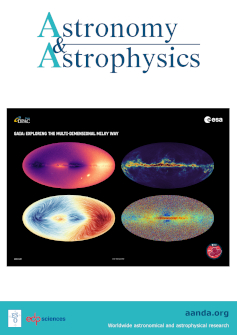JADES:红移 4 < z < 7 时的巴尔默衰减测量结果
IF 5.8
2区 物理与天体物理
Q1 ASTRONOMY & ASTROPHYSICS
引用次数: 0
摘要
作为JWST高级深河外星系巡天(JADES)的一部分,我们利用JWST/NIRSpec微快门组件(MSA)对红移z = 4 - 7的51个星系样本进行了巴尔默衰减(Hα/Hβ)测量。利用28小时的长时间曝光和棱镜/清晰配置的效率(同时也利用中分辨率光栅的信息),我们能够直接探测星系群的低质量端,达到恒星质量M⋆,低至107 M⊙。我们发现,在这样高的红移下,巴尔默衰减和M⋆之间的相关性已经建立起来了,这表明在这样早的时期,中等质量星系中的尘埃会迅速堆积起来。我们的样本中质量最低的星系(M⋆ = 1 - 3 × 107 M⊙)的巴尔默递减率非常低,只有 2.88 ± 0.08,与情况 B 一致,表明尘埃含量非常少。不过,我们也警告说,观测到的如此低的巴尔默衰减也可能部分是由于这些原始和未演化系统中电离气体的极端条件所导致的内在较低 Hα/Hβ 的结果。我们进一步将巴尔默递减与连续相衍生的恒星形成率(SFR)进行了比较,发现了相关性的初步证据,这很可能追踪了恒星形成率与冷气体质量之间的潜在联系。然而,我们注意到,在如此高的红移下,需要更大的样本来区分直接和主要相关性与间接和次要依赖性。本文章由计算机程序翻译,如有差异,请以英文原文为准。
JADES: Balmer decrement measurements at redshifts 4 < z < 7
We present Balmer decrement, Hα/Hβ, measurements for a sample of 51 galaxies at redshifts z = 4 − 7 observed with the JWST/NIRSpec micro-shutter assembly (MSA), as part of the JWST Advanced Deep Extragalactic Survey (JADES). Leveraging 28-hour long exposures and the efficiency of the prism/clear configuration (but also using information from the medium-resolution gratings), we were able to directly probe the low-mass end of the galaxy population, reaching stellar masses, M⋆, as low as 107 M⊙. We find that the correlation between the Balmer decrement and M⋆ is already established at these high redshifts, indicating a rapid buildup of dust in moderately massive galaxies at such early epochs. The lowest-mass galaxies in our sample (M⋆ = 1 − 3 × 107 M⊙) display a remarkably low Balmer decrement of 2.88 ± 0.08, consistent with Case B, suggesting very little dust content. However, we warn that such a low observed Balmer decrement may also partly be a consequence of an intrinsically lower Hα/Hβ resulting from the extreme conditions of the ionised gas in these primeval and unevolved systems. We further compare the Balmer decrement to continuum-derived star formation rates (SFRs), finding tentative evidence of a correlation, which likely traces the underlying connection between the SFR and the mass of cold gas. However, we note that larger samples are required to distinguish between direct and primary correlations from indirect and secondary dependences at such high redshifts.
求助全文
通过发布文献求助,成功后即可免费获取论文全文。
去求助
来源期刊

Astronomy & Astrophysics
地学天文-天文与天体物理
CiteScore
10.20
自引率
27.70%
发文量
2105
审稿时长
1-2 weeks
期刊介绍:
Astronomy & Astrophysics is an international Journal that publishes papers on all aspects of astronomy and astrophysics (theoretical, observational, and instrumental) independently of the techniques used to obtain the results.
 求助内容:
求助内容: 应助结果提醒方式:
应助结果提醒方式:


